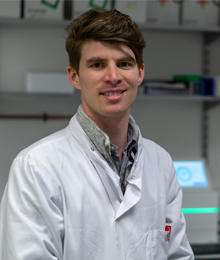An interview with Norman Van Rhijin
October 2020
Norman van Rhijin is a Research Associate based at the University of Manchester, a member of the Microbiology Society, and Society Champion. In this interview, he tells us more about his research which focuses on Aspergillus fumigatus, why he thinks microbiology is important, and why he values being a member of the Microbiology Society.

Tell us about your research.
My research is focused on Aspergillus fumigatus, a saprophytic fungus which can cause life-threatening infections in humans. I am trying to understand the translation of environment to infection, which factors are driving infection and their evolution to find new potential antifungal targets. Furthermore, I’m trying to understand A. fumigatus drug resistance and I am working on developing genetic tools in fungi.
Why is this research so important?
Chronic and invasive fungal infections have been estimated to cause over 600,000 deaths globally per year. Currently, there are limited antifungal agents available and resistance is on the rise. To develop new antifungals and improve on mortality and morbidity, a molecular understanding of fungal pathogenesis and the evolutionary basis of factors important during infection – either for a fungal or host perspective, are required.
Where did your interest in microbiology come from?
I actually started my career with the aim to become a zoologist. However, during my first year in undergraduate study, I realised I found microbiology much more interesting. This was followed by a placement project in a fungal biotechnology lab, where I realised fungi are a whole different world of microbiology.
What qualifications did you obtain before starting this role?
I obtained an undergraduate degree from Leiden University NL, a master’s degree in medical Mycology at the University of Manchester in collaboration with University Hospital South Manchester, and a PhD degree in molecular biology at the Manchester Fungal Infection Group, University of Manchester.
What are the most important skills you need for your current role?
Patience and perseverance. Fungi takes time to grow and can be quite difficult to handle. Even relatively easy experiments can require plenty of troubleshooting before a positive result is obtained. I think communication is important as well, the Manchester Fungal Infection Group houses a lot of researchers each with their own speciality. Collaboration and open discussion are the key to a successful project.
What are the professional challenges that present themselves and how do you try to overcome them?
Translating tools that are in general use in other model organisms to be useful in Aspergillus can be challenging. However, the fungal community is so supportive and collaborative, that most challenges can be solved within a few months.
What is a typical working day for you?
There isn’t really a typical working day. It depends on what type of work projects need doing, so a healthy mixture of lab work, analysis, seminars and meetings is common.
Tell us about your biggest professional achievement(s) so far.
For me, getting my PhD was a major achievement. During my first year nothing worked, and I literally had to start from the beginning again in my second year. Once experiments started working and we changed our approach to the project, everything fell into place. I think this taught me to persevere and not give up on complicated projects.
You are an active member of the Microbiology Society, tell us more about your involvement.
I only recently became a member of the Microbiology Society and became a Society Champion. I’m really excited to start organising events and activities and get more involved with the Society.
Why is it important to be a member of an organisation like the Microbiology Society?
The support the Microbiology Society gives to researchers is so important. Not only through grants, allowing researchers to attend conferences, workshops and training events; but also by providing a platform for researchers to come together and discuss their science. Having discussions with a wide range of microbiologists from all backgrounds can spark new ideas and allows collaboration throughout specialities.
Why does microbiology matter?
Microbiology truly is everything. From the environment, to our food, our health and diseases that we get. The interactions and balance between all these factors are extremely complex and I find this fascinating, not just in terms of research.


